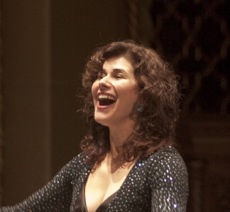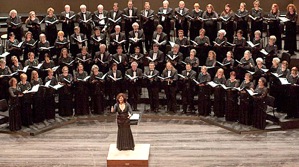
Hearing Russian liturgical music outside the church is an unusual occurrence in this country, so hearing a concert program that consists almost entirely of Russian sacred music is a rare treat indeed. The Symphony Silicon Valley Chorale, conducted by Artistic Director Elena Sharkova, offered just such a program of early 20th-century Russian liturgical music on Friday night at the Santa Clara Mission.
What makes this music both so exotically different from Western church music and so tantalizingly attractive to the listeners? To begin with, Russian sacred music is strictly vocal — instruments are not allowed inside the church during the liturgy. Only an array of bells up in the bell tower supplements the service.
The melodic roots of the music go back to ancient Byzantine chants, which were brought to Russia when it converted to Christianity in the 10th century and which were decidedly different from the Gregorian chant. The entire body of Orthodox liturgy was based on eight modes that had nothing to do with the eight medieval modes of the Latin West. Each Eastern mode was not a scale but rather a collection of short motifs out of which entire melodies were put together. During the first week of the church year, which began at Easter, chants in the first mode were performed; during the second week, melodies in the second mode, and so on until the eighth week, after which the same succession of modes was repeated again and again.

Related Article
Symphony Silicon Valley: Through the Valley of Fun
June 4, 2011
For several centuries, Russian liturgical music was strictly monophonic (consisting of a single melodic line). The traditional liturgical chants had other restrictions as well, including narrow range, predominantly stepwise melodic motion, and confinement to the eight modes. But these restrictions were compensated for by an exceptional richness of melodic and rhythmic variant developments. When, in the 17th century, the multivoiced singing was introduced into Russian liturgy, the newly created harmonies were largely based on the ancient melodic modes. As a result, the harmonic language of Russian church music has remained quite different from Western musical styles.
Yet another attribute of Russian church music is a strikingly high level of emotional ardor. The Orthodox religion is essentially built on a polarity of two extremes in their mystical unity: transcendence into eternity and dying. The entire fervor of the Eastern Church is concentrated on the glory of Resurrection that is celebrated with an ecstatic joy and extreme exaltation. The rapturous ascent into eternity, however, is preceded by the act of dying, which is not only unavoidable but also necessary. This dichotomy explains the tremendous emotional compass that marks Russian liturgical and, often, nonliturgical music. Easter and its jubilant celebration of Divine Transfiguration marks the climactic centerpiece of the Orthodox church year. Every year the extended and elaborate Easter services arouse the worshipers’ emotions to the point of ecstasy — but not before throwing them into an abyss of poignant desolation.
Singing a Masterwork From a New Edition
All these aspects of Russian liturgical music were in evidence on Friday night. The centerpiece of the program was All-Night Vigil by Mikhail Ippolitov-Ivanov. A student of Rimsky-Korsakov, he is more familiar to Western audiences for his orchestral suites Caucasian Sketches. The Vigil, published in Russia in 1905, disappeared from public view after the Bolshevik Revolution. Only in 1989 did it resurface in Russia, still in the original Jurgenson edition. Recently, on Elena Sharkova’s request, Musica Russica published a new edition of the score with an added transliteration from the Cyrillic alphabet.
All-Night Vigil is arguably one of the best compositions of Ippolitov-Ivanov. Bridging, both chronologically and stylistically, All-Night Vigils by Tchaikovsky and Rachmaninov, Ippolitov-Ivanov’s inspired setting is masterfully written. It’s probably unfair to compare it to Rachmaninov’s towering monument of the genre, but Ippolitov-Ivanov’s Vigil can certainly stand on its own as a work of great beauty. Beguilingly melodious, it encompasses a wide range of moods, typical of Russian church music, from the darkly hued, stark textures of “Blessed Is the Man” to the ethereal “Gladsome Light” to the dazzlingly triumphant conclusion of the piece.
On Friday, the Vigil was complemented by several other short sacred pieces: three selections from Rachmaninov’s All-Night Vigil and three prayers by the prominent church composers Nikolai Kedrov and Pavel Chesnokov. Kedrov’s Our Father and Chesnokov’s Angel Cried Out are probably the most deeply moving creations among many other settings of these prayers (and these two have always been my personal favorites).
A surprising and welcome addition to the program was the appearance of the St. John of San Francisco Men’s Chorale, directed by the conductor and singer Nicholas Kotar. The group consists of 10 singers, of which two, regrettably, could not perform in the concert. Nonetheless, the ensemble sang a few ancient Orthodox chants, hymns, and antiphons with a rich, focused, and vibrant sound. The undulating, free-flowing, rhythmically irregular, austere and yet intensely impassioned prayers demonstrated to the audience the ancestry and the underpinnings of the later Russian choral masterpieces.
The only secular offering in the program came at the end, with Elegy by Viktor Kalinnikov, the younger brother of the better-known symphonic composer Vasily Kalinnikov. That was followed by a double encore, the cheerful Russian folksong Veniki (Brooms), first rendered in a moderately fast tempo and then, after a thunderous round of applause, recapped at a much faster speed.
Conductor Sharkova fully captured the wide emotional span of the music. She elicited suave phrasing and a variety of expressive colors from her volunteer choir, which sang with dedication and obvious enjoyment. The musical numbers were interlaced with Sharkova’s lively, witty comments, which augmented the irresistible appeal of the entire program.
